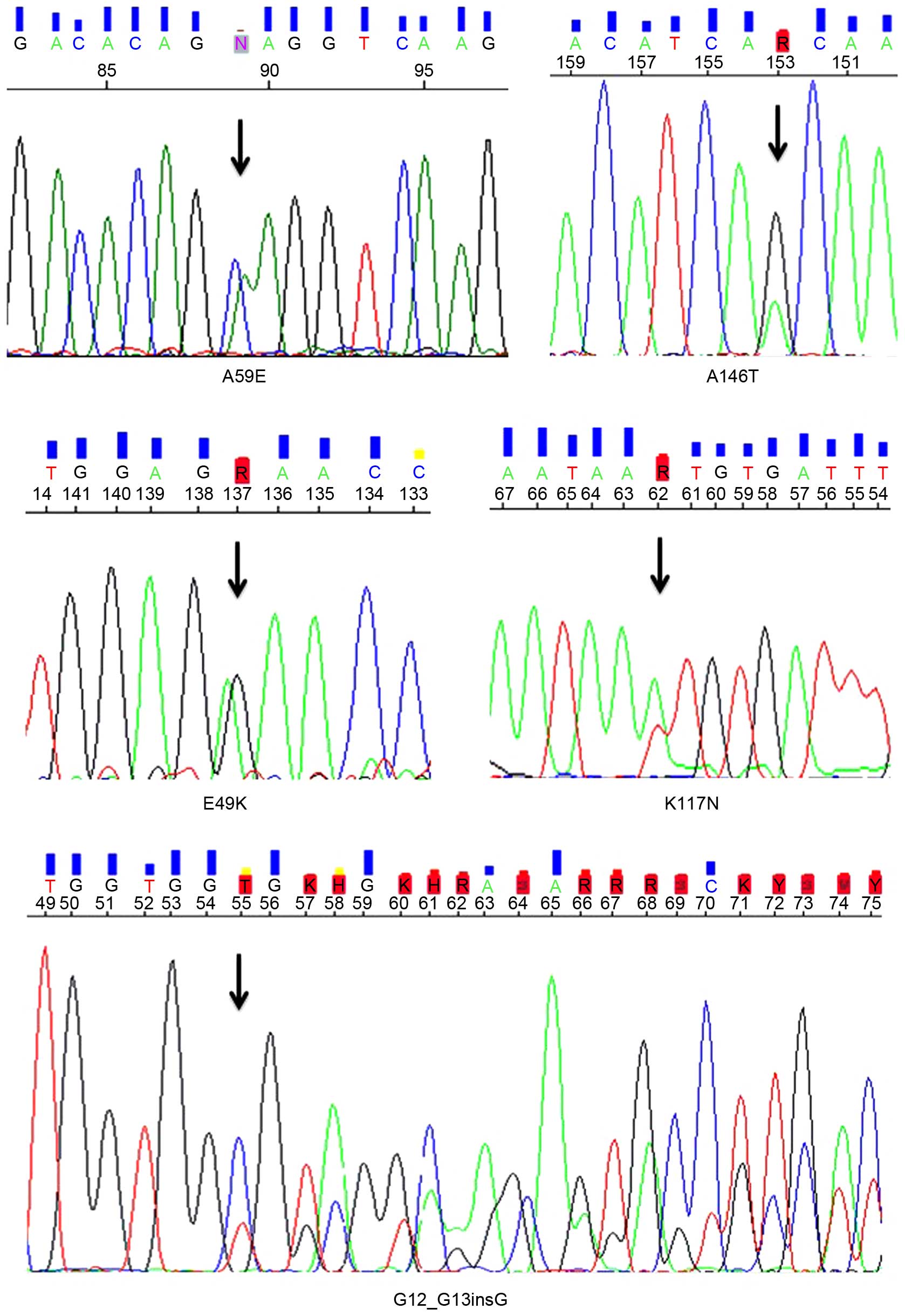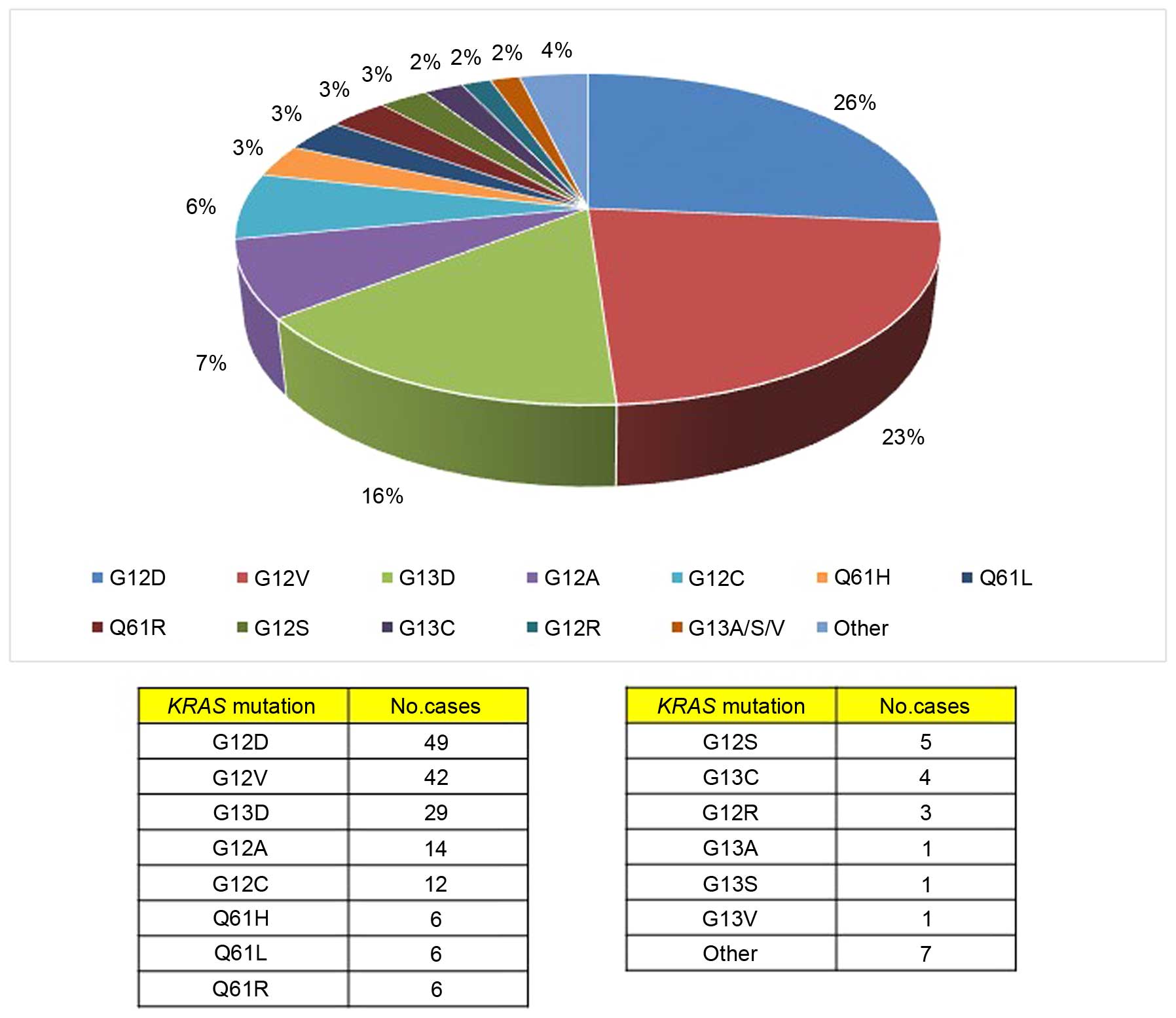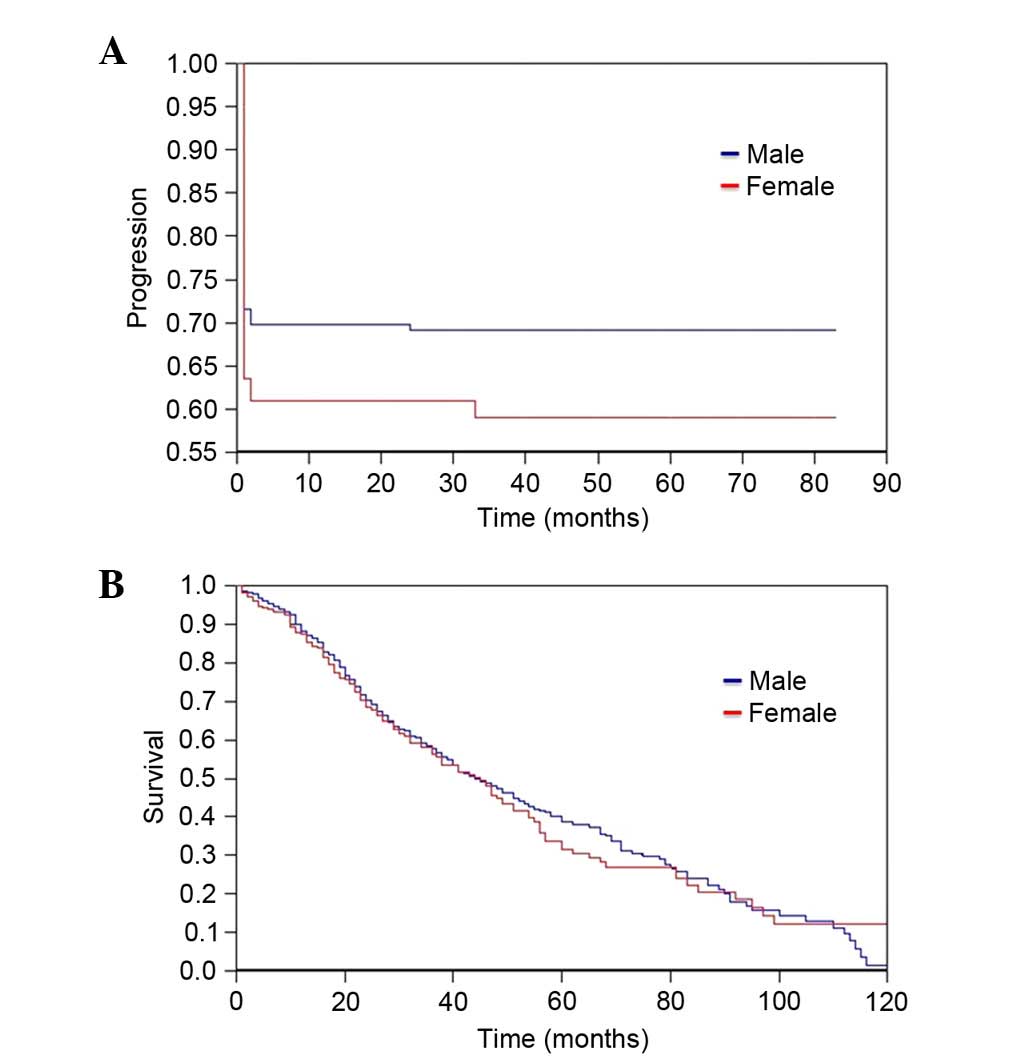|
1
|
Palmieri G, Paliogiannis P, Scognamillo F,
Budroni M, Cesaraccio R, Pulighe F, Tanda F, Trignano M and Cossu
A: Colorectal cancer epidemiology in an area with a spontaneous
screening program. Acta Med Mediterr. 29:231–234. 2013.
|
|
2
|
Edwards BK, Ward E, Kohler BA, Eheman C,
Zauber AG, Anderson RN, Jemal A, Schymura MJ, Lansdorp-Vogelaar I,
Seeff LC, et al: Annual report to the nation on the status of
cancer, 1975–2006, featuring colorectal cancer trends and impact of
interventions (risk factors, screening, and treatment) to reduce
future rates. Cancer. 116:544–573. 2010. View Article : Google Scholar : PubMed/NCBI
|
|
3
|
Paliogiannis P, Cossu A, Tanda F, Palmieri
G and Palomba G: KRAS mutational concordance between primary and
metastatic colorectal adenocarcinoma. Oncol Lett. 8:1422–1426.
2014.PubMed/NCBI
|
|
4
|
Jorissen RN, Walker F, Pouliot N, Garrett
TP, Ward CW and Burgess AW: Epidermal growth factor receptor:
Mechanisms of activation and signalling. Exp Cell Res. 284:31–53.
2003. View Article : Google Scholar : PubMed/NCBI
|
|
5
|
Yuan ZX, Wang XY, Qin QY, Chen DF, Zhong
QH, Wang L and Wang JP: The prognostic role of BRAF mutation in
metastatic colorectal cancer receiving anti-EGFR monoclonal
antibodies: A meta-analysis. PLoS One. 8:e659952013. View Article : Google Scholar : PubMed/NCBI
|
|
6
|
Malumbres M and Barbacid M: RAS oncogenes:
The first 30 years. Nat Rev Cancer. 3:459–465. 2003. View Article : Google Scholar : PubMed/NCBI
|
|
7
|
Heinemann V, Stintzing S, Kirchner T,
Boeck S and Jung A: Clinical relevance of EGFR- and KRAS-status in
colorectal cancer patients treated with monoclonal antibodies
directed against the EGFR. Cancer Treat Rev. 35:262–271. 2009.
View Article : Google Scholar : PubMed/NCBI
|
|
8
|
Bardelli A and Siena S: Molecular
mechanisms of resistance to cetuximab and panitumumab in colorectal
cancer. J Clin Oncol. 28:1254–1261. 2010. View Article : Google Scholar : PubMed/NCBI
|
|
9
|
Lin AY, Buckley NS, Lu AT, Kouzminova NB
and Salpeter SR: Effect of KRAS mutational status in advanced
colorectal cancer on the outcomes of anti-epidermal growth factor
receptor monoclonal antibody therapy: A systematic review and
meta-analysis. Clin Colorectal Cancer. 10:63–69. 2011. View Article : Google Scholar : PubMed/NCBI
|
|
10
|
Andreyev HJ, Norman AR, Cunningham D,
Oates J, Dix BR, Iacopetta BJ, Young J, Walsh T, Ward R, Hawkins N,
et al: Kirsten ras mutations in patients with colorectal cancer:
The ‘RASCAL II’ study. Br J Cancer. 85:692–696. 2001. View Article : Google Scholar : PubMed/NCBI
|
|
11
|
Imamura Y, Morikawa T, Liao X, Lochhead P,
Kuchiba A, Yamauchi M, Qian ZR, Nishihara R, Meyerhardt JA, Haigis
KM, et al: Specific mutations in KRAS codons 12 and 13, and patient
prognosis in 1075 BRAF wild-type colorectal cancers. Clin Cancer
Res. 18:4753–4763. 2012. View Article : Google Scholar : PubMed/NCBI
|
|
12
|
Phipps AI, Buchanan DD, Makar KW, Win AK,
Baron JA, Lindor NM, Potter JD and Newcomb PA: KRAS-mutation status
in relation to colorectal cancer survival: The joint impact of
correlated tumour markers. Br J Cancer. 108:1757–1764. 2013.
View Article : Google Scholar : PubMed/NCBI
|
|
13
|
Palomba G, Colombino M, Contu A, Massidda
B, Baldino G, Pazzola A, Ionta M, Capelli F, Trova V, Sedda T, et
al: Prevalence of KRAS, BRAF, and PIK3CA somatic mutations in
patients with colorectal carcinoma may vary in the same population:
Clues from Sardinia. J Transl Med. 10:1782012. View Article : Google Scholar : PubMed/NCBI
|
|
14
|
Schubbert S, Shannon K and Bollag G:
Hyperactive Ras in developmental disorders and cancer. Nat Rev
Cancer. 7:295–308. 2007. View Article : Google Scholar : PubMed/NCBI
|
|
15
|
Arrington AK, Heinrich EL, Lee W, Duldulao
M, Patel S, Sanchez J, Garcia-Aguilar J and Kim J: Prognostic and
predictive roles of KRAS mutation in colorectal cancer. Int J Mol
Sci. 13:12153–12168. 2012. View Article : Google Scholar : PubMed/NCBI
|
|
16
|
de Macedo MP, de Lima LG, Begnami MD, de
Melo FM, Andrade LD, Lisboa BC, Soares LM, Soares FA, Carraro DM
and da Cunha IW: KRAS insertions in colorectal cancer: What do we
know about unusual KRAS mutations? Exp Mol Pathol. 96:257–260.
2014. View Article : Google Scholar : PubMed/NCBI
|
|
17
|
Tanaka M, Omura K, Watanabe Y, Oda Y and
Nakanishi I: Prognostic factors of colorectal cancer: K-ras
mutation, overexpression of the p53 protein, and cell proliferative
activity. J Surg Oncol. 57:57–64. 1994. View Article : Google Scholar : PubMed/NCBI
|
|
18
|
Morrin M, Kelly M, Barrett N and Delaney
P: Mutations of Ki-ras and p53 genes in colorectal cancer and their
prognostic significance. Gut. 35:1627–1631. 1994. View Article : Google Scholar : PubMed/NCBI
|
|
19
|
Bennett MA, Kay EW, Mulcahy H, O'flaherty
L, O'donoghue DP, Leader M and Croke DT: Ras and p53 in the
prediction of survival in Dukes' stage B colorectal carcinoma. Clin
Mol Pathol. 48:M310–M315. 1995. View Article : Google Scholar : PubMed/NCBI
|
|
20
|
Lee JC, Wang ST, Lai MD, Lin YJ and Yang
HB: K-ras gene mutation is a useful predictor of the survival of
early stage colorectal cancers. Anticancer Res. 16:3839–3844.
1996.PubMed/NCBI
|
|
21
|
Pricolo VE, Finkelstein SD, Wu TT, Keller
G, Bakker A, Swalsky PA and Bland KI: Prognostic value of TP53 and
K-ras-2 mutational analysis in stage III carcinoma of the colon. Am
J Surg. 171:41–46. 1996. View Article : Google Scholar : PubMed/NCBI
|
|
22
|
Kressner U, Bjørheim J, Westring S,
Wahlberg SS, Påhlman L, Glimelius B, Lindmark G, Lindblom A and
Børresen-Dale AL: Ki-ras mutations and prognosis in colorectal
cancer. Eur J Cancer. 34:518–521. 1998. View Article : Google Scholar : PubMed/NCBI
|
|
23
|
Andreyev HJ, Norman AR, Cunningham D,
Oates JR and Clarke PA: Kirsten ras mutations in patients with
colorectal cancer: The multicenter ‘RASCAL’ study. J Natl Cancer
Inst. 90:675–684. 1998. View Article : Google Scholar : PubMed/NCBI
|
|
24
|
Roth AD, Tejpar S, Delorenzi M, Yan P,
Fiocca R, Klingbiel D, Dietrich D, Biesmans B, Bodoky G, Barone C,
et al: Prognostic role of KRAS and BRAF in stage II and III
resected colon cancer: Results of the translational study on the
PETACC-3, EORTC 40993, SAKK 60-00 trial. J Clin Oncol. 28:466–474.
2010. View Article : Google Scholar : PubMed/NCBI
|
|
25
|
Samowitz WS, Curtin K, Schaffer D,
Robertson M, Leppert M and Slattery ML: Relationship of Ki-ras
mutations in colon cancers to tumor location, stage, and survival:
A population-based study. Cancer Epidemiol Biomarkers Prev.
9:1193–1197. 2000.PubMed/NCBI
|
|
26
|
Ogino S, Nosho K, Kirkner GJ, Kawasaki T,
Meyerhardt JA, Loda M, Giovannucci EL and Fuchs CS: CpG island
methylator phenotype, microsatellite instability, BRAF mutation and
clinical outcome in colon cancer. Gut. 58:90–96. 2009. View Article : Google Scholar : PubMed/NCBI
|
|
27
|
Zlobec I, Kovac M, Erzberger P, Molinari
F, Bihl MP, Rufle A, Foerster A, Frattini M, Terracciano L,
Heinimann K and Lugli A: Combined analysis of specific KRAS
mutation, BRAF and microsatellite instability identifies prognostic
subgroups of sporadic and hereditary colorectal cancer. Int J
Cancer. 127:2569–2575. 2010. View Article : Google Scholar : PubMed/NCBI
|
|
28
|
Winder T, Mündlein A, Rhomberg S,
Dirschmid K, Hartmann BL, Knauer M, Drexel H, Wenzl E, De Vries A
and Lang A: Different types of K-Ras mutations are conversely
associated with overall survival in patients with colorectal
cancer. Oncol Rep. 21:1283–1287. 2009. View Article : Google Scholar : PubMed/NCBI
|
|
29
|
Bazan V, Agnese V, Corsale S, Calò V,
Valerio MR, Latteri MA, Vieni S, Grassi N, Cicero G, Dardanoni G,
et al: Specific TP53 and/or Ki-ras mutations as independent
predictors of clinical outcome in sporadic colorectal
adenocarcinomas: Results of a 5-year Gruppo Oncologico dell'Italia
Meridionale (GOIM) prospective study. Ann Oncol. 16(Suppl 4):
iv50–iv55. 2005.PubMed/NCBI
|
|
30
|
Ren J, Li G, Ge J, Li X and Zhao Y: Is
K-ras gene mutation a prognostic factor for colorectal cancer: A
systematic review and meta-analysis. Dis Colon Rectum. 55:913–923.
2012. View Article : Google Scholar : PubMed/NCBI
|
|
31
|
Troungos C, Valavanis C, Kapranos N and
Kittas C: K-ras mutation in Greek patients with poorly and
moderately differenciated tumours of the lower intestinal tract.
Anticancer Res. 17:1399–1404. 1997.PubMed/NCBI
|
|
32
|
Cerottini JP, Caplin S, Saraga E, Givel JC
and Benhattar J: The type of K-ras mutation determines prognosis in
colorectal cancer. Am J Surg. 175:198–202. 1998. View Article : Google Scholar : PubMed/NCBI
|

















